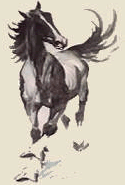"Why did they have to cross the marsh, and come over to this
side? Is this side really better than the other? Don't sweet potatoes
and cogongrass grow over there, too? Then, why did they have to
cross the marsh? Couldn't they have taken an easier route around?
Was it worth that much hardship and the deaths of so many people?"
The endless questions of the infamous young halfbreed with
the webbed feet and hands annoyed him. He spit out a mouthful
of saliva and rose from the grass, remembering to brush the bits
of grass from his pants. He walked toward the herd of oxen grazing
with lowered heads in the distance.
The web-footed young halfbreed gazed after the man in black
until his black eyes began to smart. He watched as that man entered
the dim graveyard. He ... Was he that young halfbreed? What was
his name? Why was he sitting there? -- Let's call him "Little
Halfbreed". As for his sitting there ... Let's just say he was
sitting there watching the oxen and sheep -- The story-telling
is always interrupted by the young fellow who has an all-consuming
thirst for knowledge and impatient temperament. -- That's also
one of the ways to pass on tradition from one generation to another.
It is getting dark. Instinctively, the oxen and sheep draw
closer. The mournful blue eyes of the cows are filled with motherly
concern. They arch their backs slightly. With their foreheads,
the calves begin to butt at the udders of their mothers and suck
noisily .
"My grandfather told me ... Grandfather died many years ago,"
I tell my runny- nosed grandson. "When I was your age, I came
here with my grandfather to herd oxen and sheep. He told me a
lot of things. The sun was whiter than it is now, but the marsh
was almost the same. We tied strings of shiny, flame-red locusts
to the stems of three-edged grass. Oil oozed out when we cooked
the locusts over the fire."
My grandson pops a well-cooked locust into his mouth.
According to my grandfather, Little Halfbreed would nod his
head vigorously, as if he were shaking off the last drops of urine.
He sat on that spot every day at dawn. To the south was the marsh
with reddish sludge; to the east was the grassland; to the west,
grassland and cultivated fields; and to the north, a small village.
On the grassland, there were three willow trees, their branches
hanging dejectedly like the heads of three people at a funeral.
Little Halfbreed sat there waiting for "him" -- a fellow slim
as a black fish. Just as the sun was rising on the horizon, the
thin fellow would appear from that graveyard overgrown with trees
and bushes. He played with Little Halfbreed and told the story
about crossing the marsh.
